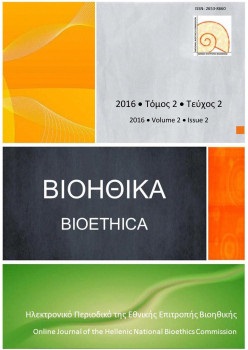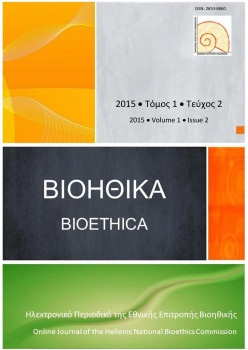Ο άγαμος μοναχικός άντρας και η πρόσβασή του στην ιατρικώς υποβοηθούμενη αναπαραγωγή στην Ελλάδα και στο Ηνωμένο Βασίλειο
Resumen
Η παρούσα δημοσίευση συγκρίνει το νομικό πλαίσιο της Ελλάδας και του Ηνωμένου Βασιλείου στο ζήτημα της πρόσβασης στις μεθόδους ιατρικώς υποβοηθούμενης αναπαραγωγής - και στη συνεπακόλουθη απόκτηση τέκνου - από έναν άγαμο μοναχικό άνδρα. Αρχικά παρουσιάζεται το δικαίωμα του ανθρώπου και δη του άγαμου μοναχικού άνδρα στην αναπαραγωγή. Παράλληλα εξηγούνται οι λόγοι για τους οποίους οι έννομες τάξεις επιτρέπουν ρητά την πρόσβαση στην ιατρικώς υποβοηθούμενη αναπαραγωγή μόνο στις άγαμες μοναχικές γυναίκες.
Εν συνεχεία, εκτίθεται το νομικό καθεστώς που διέπει την μέθοδο της παρένθετης μητρότητας και στις δυο χώρες, καθώς πρακτικά αυτή είναι η μοναδική μέθοδος με την οποία μπορεί να αποκτήσει τέκνο ένας άγαμος μοναχικός άνδρας. Ακολουθεί η παρουσίαση του ελληνικού νομικού πλαισίου, το οποίο εξαιρεί τον άγαμο μοναχικό άνδρα από την πρόσβαση στην ιατρικώς υποβοηθούμενη αναπαραγωγή και των δικαστικών αποφάσεων που προσπάθησαν να καλύψουν το νομικό κενό με αναλογική εφαρμογή των σχετικών διατάξεων για τις άγαμες μοναχικές γυναίκες. Κατόπιν, αναλύεται το καθεστώς που διέπει το Ηνωμένο Βασίλειο ως προς το ζήτημα, όπου η νομολογία έχει παρακάμψει τη μη ρητή συμπερίληψη του άγαμου μοναχικού άνδρα στα πρόσωπα που δικαιούνται να αποκτήσουν τέκνο με τις μεθόδους ιατρικώς υποβοηθούμενης αναπαραγωγής.
Τέλος, ως λύση του ζητήματος προκρίνεται ο συνδυασμός των δυο καθεστώτων, με την ουσιαστική και εκ των πραγμάτων αναγνώριση του δικαιώματος των άγαμων μοναχικών ανδρών στην απόκτηση τέκνου με τη βοήθεια της τεχνολογίας.
Article Details
- Cómo citar
-
Βασιλείου (Marianna Vassiliou) Μ. (2016). Ο άγαμος μοναχικός άντρας και η πρόσβασή του στην ιατρικώς υποβοηθούμενη αναπαραγωγή στην Ελλάδα και στο Ηνωμένο Βασίλειο. Bioethica, 2(2), 36–50. https://doi.org/10.12681/bioeth.19780
- Sección
- Original Articles
Authors who publish with this journal agree to the following terms:
- Authors retain copyright and grant the journal right of first publication with the work simultaneously licensed under a Creative Commons Attribution CC BY 4.0 License, which allows for immediate free access to the work and permits any user to read, download, copy, distribute, print, search, or link to the full texts of articles, crawl them for indexing, pass them as data to software, or use them for any other lawful purpose. Appropriate credit must be given by citing the author(s) and the original publication in this journal.
- Authors are able to enter into separate, additional contractual arrangements for the non-exclusive distribution of the journal's published version of the work (e.g. post it to an institutional repository or publish it in a book), with an acknowledgement of its initial publication in this journal.
We encourage authors to deposit their articles, as well as data underlying the publications, in institutional and/or other appropriate subject repositories.
Bioethica permits and encourages authors to archive the final publication pdf in institutional (e.g. the repository of the National Hellenic Research Foundation) or other appropriate subject repositories (e.g. SSOAR repository for social sciences), in compliance with institutional and/or funder open access policies, after publication in the BIOETHICA. Authors must provide bibliographic details that credit publication in the journal, as well as related funding details (when applicable).
Lists of institutional and other subject-based academic open access repositories can be found listed by country at the registry http://opendoar.org/countrylist.php
If your institution does not possess a repository you may deposit a copy of your paper at no cost with www.zenodo.org , the repository supported for open access research in the EU by the European Commission, through the project OpenAIRE (www.openaire.eu )




